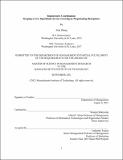Regenerative Coordination: Keeping a Live Algorithmic Service Growing by Perpetuating Disruptions
Author(s)
Zhang, Alan
DownloadThesis PDF (4.014Mb)
Advisor
Orlikowski, Wanda
Terms of use
Metadata
Show full item recordAbstract
Many organizations today, in their move to online platforms, seek to provide a ‘live’ service—a digital service capable of updating automatically, offering users continual improvements in content and functionality. I examined the work required to keep such a service going, and found developers struggling to coordinate their work in the face of heterogeneous, concurrent, and indefinite updates. My 15-month field study of an agricultural technology company explores how its members, along with its algorithms, were able to sustain a live imagery-analytics service, despite frequent, unexpected, and disruptive updates. Existing literature shows that sense-making and provisional settlements can be critical for coordinating distributed and dynamic work, but takes a perspective which centers on human actors. Taking a broader perspective, I suggest that the algorithms working in a live service may do neither. I found that algorithms frequently updated operations with changes unanticipated by members, and in so doing, disrupted operations that members had previously settled and, until then, considered usable. Members responded to these updates with further updates required to regenerate the service, but with each update new disruptions emerged. Drawing on these findings, I develop the notion of regenerative coordination that identifies the specific coordination practices that regenerate a live service through updates, thus keeping the service viable and valuable to users. Doing so however, perpetuates disruptions. This paradoxical outcome is the inadvertent result of a process that keeps a service live and growing. I end with contributions to coordination research.
Date issued
2021-09Department
Sloan School of ManagementPublisher
Massachusetts Institute of Technology